I immersed myself with Dario Argento/Mario Bava/Lucio Fulci flicks a few years back (so probably 10 years back) having approached them most likely from my immersion in Italian zombie films of the 70s, which was actually a thing. Relatively recently (so probably a few years back) I watched Argento’s The Bird with the Crystal Plumage, a stylish thriller and a departure from his standard psychological horror. It hooked me.
And so I became obsessed with Italian giallo films. Their characteristics, generally, include: murder (natch), suggestive supernatural elements, the absolute grooviest clothing and interior design that you could ever imagine from 70s Italy–even if the setting was ostensibly the US or Germany or wherever–and a high breasts-per-scene ratio. The mood will range from thrilling cat and mouse tension to a Gothic molasses of lingering ennui. A more keen eye than mine could enumerate more fully on the shared cinematic tropes. The quality, as with anything of course, is greater-or-lesser but they are never a waste of time if you’re looking for that impossible combination of gritty murder and stylish, iconic 70s.
Actors repeat across director and each director has dozens of films. As illustration, here is an abbreviated match of the movies and the directors and the actors in common (just from the movies I’ve watched):
| Movie | Director | Actors |
|---|---|---|
| All the Colors of the Dark (Tutti i colori del buio) | Sergio Martino | Edwige Fenech George Hilton Marina Malfatti Carla Mancini Ivan Rassimov George Rigaud |
| The Bird with the Crystal Plumage (L’uccello delle plume di cristallo) | Dario Argento | Carla Mancini Umberto Raho |
| The Case of the Bloody Iris (Perchè qualle strane gocce di sangue di corpo di Jennifer?) | Anthony Ascot | Edwige Fenech George Hilton Marina Malfatti Carla Mancini George Rigaud |
| The Cat o’ Nine Tails (Il gatto a nove code) | Dario Argento | Carlo Alghiero |
| The Night Evelyn Came Out of the Grave (La notte che Evelyn uscì dalla tomba) | Emilio Miraglia | Marina Malfatti Umberto Raho |
| The Red Queen Kills Seven Times (La dama rossa uccide sette volte) | Emilio Miraglia | Marina Malfatti |
| The Strange Vice of Mrs. Wardh (Lo strano vizio della signora Wardh) | Sergio Martino | Carlo Alghiero Edwige Fenech George Hilton Marina Malfatti |
| Your Vice is a Locked Room and Only I Have the Key (Il tuo vizio e una stanza chiuda e sono io ne ho la chiave) | Sergio Martino | Edwige Fenech Carla Mancini Ivan Rassimov |
Several of the films I took detailed notes while watching. Others regrettably not and I’ll include here just for completeness.
All the Colors of the Dark (1972)
[ IMDB | Rotten Tomatoes | Wikipedia ]

The Bird with the Crystal Plumage (1970)
[ IMDB | Rotten Tomatoes | Wikipedia ]

The Case of the Bloody Iris (1972)
[ IMDB | Rotten Tomatoes | Wikipedia ]
Dir. Anthony Ascot, Edwige Fenech and George Hilton

This had the whodunnit mystery of the others with a moderately twisty end. Still, the opening and closing scenes have an elliptical symbolism that I haven’t quite figured out yet. (Trivia: it was produced by Sergio’s brother Luciano. More trivia: Luciano was married to Edwige Fenech.)
It opens with a payphone call before the credits (closing similarly). Early on we are introduced to the playboy world of the architect Andrea (George Hilton) and his colorfully and exaggeratedly effeminate photographer brother Arthur (Orsete Lionello) during a photo shoot of topless, body-painted women in an ad for … uhhh, not sure. Jennifer (Edwige Fenech) will appear later to pose for the flamboyant Arthur, putting him in an absolute tizzy *hands swish* because she believes she see Adam–her sex-cult leader ex-husband–lurking in the studio. Flashbacks show the cult uses the iris as a symbol of women submitting to many men (however could these films get accused of misogyny?).
I swear I’m starting to see the same minimalist paintings in various swank apartments in these films. Maybe Frank Stella?
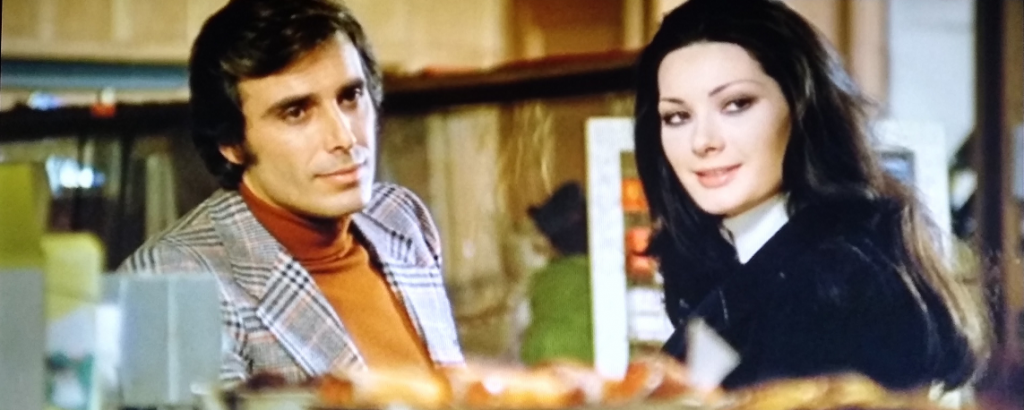
Mizar is drowned in her bathtub (!) and Edwige and Paola move into her apt. Colorful neighbors are: elderly religious lady who buys murder mystery magazines for her possibly-mentally-deficient son, Sheila who sends a suspicious love letter to Jennifer, and Sheila’s aging father who plays violin. So many suspects and McGuffins.
An entertaining and light addition to the cast is a philatelist police commissioner Enci, who is working on the case, and his hapless assistant commissioner Renzi, who is assigned to follow Andrea. The audience watches via Renzi’s efforts, Jennifer and Andrea fall in love, but the moment Andrea is caught in a compromising position by a crowd of witnesses–he is approached in the middle of a busy street by Marilyn as she’s dying from stab wounds–Renzi is busy on a lunch break in his car. Andrea is on the run.
The end game (remember all of those neighbors?) brings philatelist Renzi, Enci, Edwige, Andrea (of course) and The Killer all in the mayhem of their stylish stylish apartment building.
The Cat o’ Nine Tails
[ IMDB | Rotten Tomatoes | Wikipedia ]
Filmed in Turin and Rome.
Characters
- Franco Arno (Karl Malden, blind puzzle-maker)
- Lori, his niece (Cinzia De Carolis), later in several extreme films:
- Libidine [ IMDB ] – About a human/snake genetic experiment she has sex with. Considered pornographic-adjacent.
- Night of the Devils [ IMDB ] – A gore fest about a family of vampires. Looks disgustingly interesting, but the reviews aren’t that positive.
- Cannibal Apocalypse [ IMDB ] by Antonio Margheriti (who directed the incredibly groovy sci-fi flick Wild, Wild Planet [ IMDB ]) along with Giovanni Lombardo Radice who was in Ruggero Deodato’s notorious Cannibal Holocaust
- Carlo Giordani, reporter (James Franciscus, also in , Night Slaves), later in
- Beneath the Planet of the Apes [ IMDB ]
- Night Slaves [ IMDB ] – Who’s source novel was in my first batch of pulp sci-fi that I read and distributed around the world.
- Dr. Calabresi (Carlo Alighiero, also in The Strange Vice of Mrs. Wardh) engaged to Bianca Merusi
- Bianca Merusi (Rada Rassimov)
- Anna Terzi (Catherine Spaak), I randomly found praise for the Luca Sabatelli dress she wore in the film from @rachael_nisbett on Twitter.
Ennio Morricone soundtrack. Free jazz.
Blind reporters working together. Killer’s irises (not eyes) in tight focus before he kills. Standard POV camera for killer. Keen-eared blind man.
Franco and his niece Lori walk by a car, he takes note of the man for some reason. Later someone breaks into the nearby genetics institute but steals nothing. The police and the executives suspect industrial espionage.
Calabresi is murdered.
Dr. Calabresi tells Bianca that he knows who broke in, but he is pushed in front of a train the next day before he can tell her.
Photographer is murdered.
The police think it’s an accident but Carlo is contacted by Franco who tells him to get an un-cropped photo. It shows Calabresi being pushed. The killer gets to Carlo’s photographer friend, kills him, and steals the negative.
Franco and Carlo are on the case. Carlo goes to visit Prof. Terzi and afterwards spars with Anna. They go on a joyride through the city and she loses the cops who are tailing them. At a rooftop bar she provides background biographies of all involved in the genetics company and tells him about a secret drug they’re working for a government research project. The drug will test whether people have criminal tendencies. She sends him to speak with Prof. Braun at The St. Peters Club (a gay bar). Braun steers him away from the investigation.
Bianca is murdered.
Franco goes to see Bianca and Lori notes that she nervously pulls at a locket around her neck. After they leave, she calls Franco and Carlo as they are discussing the case and tells them she knows killed Dr. Calabresi. She plans to meet them but is killed after their call ends.
The killer sends Franco and Carlo a letter saying that they are now a target.
Carlo inteviews several the the doctors at the institute. A mysterious figure injects poison into milk cartons delivered to his door. Post-sex with Anna, he realizes the threat and slaps the milk out of Anna’s hand.
Braun is murdered.
Carlo and a criminal friend break into Terzi’s house and discover in hidden documents that Dr. Terzi adopted Anna “Marini” (now Terzi). Carlo prints a story that Braun is a suspect in three murders. An anonymous visitor tells him were he can find Braun but when Carlo arrives Braun is dead.
Carlo and Franco go to Bianca’s grave to search the amulet. There, Franco struggles with the killer and wounds him. After, the killer abducts Lori and threatens to kill her if they tell anyone about it. They go to the police and head to the lab for the final confrontation.
Further distractions after researching:
Carolis’s later film Libidine is described in an IMDB review:
It certainly somewhat predates Japanese Genki-Genki videos.Tons of sleaze and naked female flesh including graphic sex,lesbian intercourse,masturbation and some bizarre acts of bestiality.7 out of 10
And so, I had to look up Genki-Genki. Assuming it was tentacle porn I was more correct that I could’ve hoped. First, Film Review: Genki Genki 18 from HNN (graphic pics):
And I’ve now been reviewing “extreme” cinema here at Horrornews.net for four years, and not a single film has been “too much” for me. Until now…
I gotta say, I’m somewhat curious. Second, from Perverted but beautiful by Cakehead Loves Evil (virtuosic oil paintings):
Monica Cook paints BEAUTIFUL and very disturbing portraits of women featuring niche sexual imagery such as genki genki (it involves bugs & insects) & the sexualized eating of food. Many of them also reflect the squid porn feature, which is this blogs most highly viewed post ever. To be honest if these were photographs I think I would be a bit ewwwwwwww, but as amazing paintings I adore them…
The Night Evelyn Came Out of the Grave (1971)
[ IMDB | Rotten Tomatoes | Wikipedia ]

IMDB says that this had 9 different English language edits, some with such radical alterations that the plot was incomprehensible. There’s much nudity (as with most giallo) so that probably contributed to the detrimental editing, and it is probably common when distributing these films for more prudish audiences.
The movie opens as a deranged patient attempts to escape from Dr. Richard Timberlane psychiatric hospital. He is captured and not seen from again, but both Dr. Timberlane and madness play a part in the subsequent drama.
Lord Alan Cunningham, once a patient of Timberlane’s, had lost his wife Evelyn and now seduces women who look like her, bringing them back to his estate to torture and kill, often falling into a mania where he hallucinates reprimands from his deceased wife. First to die in the film is a prostitute, then Susan the exotic dancer. Alan is being blackmailed by Evelyn’s brother Albert who watches the proceedings with a mix of perversion and horror, but probably just greed, and demands cash for his silence.
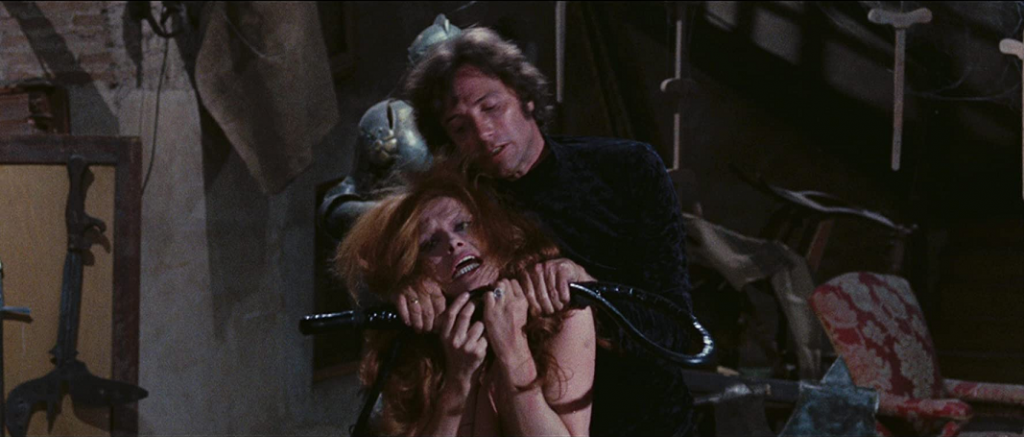
There are three notable themes echoed from other giallo films: much of the action occurs in Alan’s decrepit estate castle (cf. the the author’s estate in Your Vice), a man obsessed by the painting of a dead woman (also Your Vice, but there it was his mother), and the reading of a will (The Queen Kills). All of these Gothic tropes are likely to appear in other giallo films.
Alan at one point attends a seance with Miranda the psychic who was introduced to him by the wheelchair-confined aunt Agatha. His cousin, the playboy, George Harriman also attends and is set to inherit the family estate if Alan … cannot. Suspicious, no?
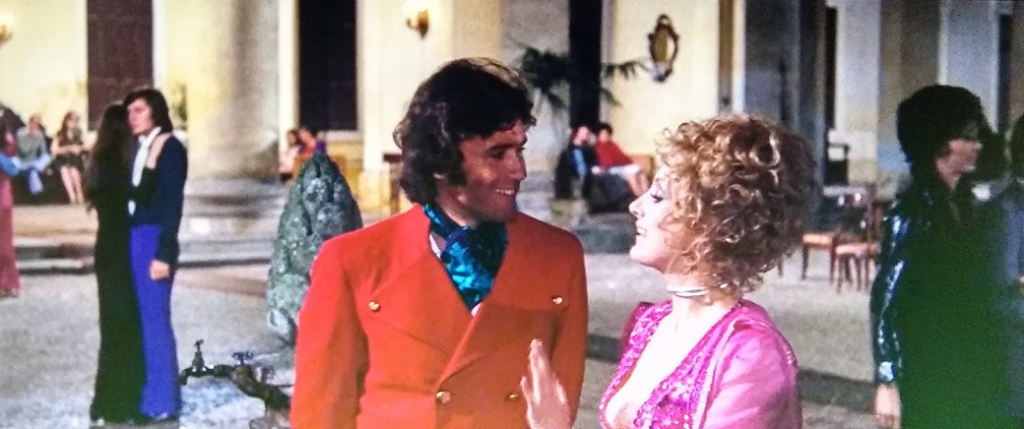
The third redhead of the flick (not including the eponymous Evelyn), Gladys, shows up at George’s party and she and Alan are married the next day. Whaaaa? To avoid any further redhead-induced mania, he hires only blonde maids with the same short, curly hair. These films tell as much in their visuals as their dialog. Soon he is seeing his wife again, and the camera presents those visions with the same visual distortion as the escaped mental patient at the start of the film. Meaningful? Maybe.
The last part of the film: Evelyn is not in her crypt, Albert is murdered, Agatha is murdered (come on, you know most characters will be murdered in these films), and a pool full of acid provides justice without the gore you’d hoped for.
The Red Queen Kills Seven Times (1972)
[ IMDB | Rotten Tomatoes | Wikipedia ]

Emilio Miraglia directing. Marina Malfatti from All the Colors of the Dark (above) and The Night Evelyn Came Out of the Grave (below).
We enter with a castle and two young girls, sisters we learn, playing… then fighting. Their grandfather tells them a story of the garish painting that evoked one of the girl’s violent mania: every hundred years the Black Queen kills kills her sister the Red Queen by stabbing her seven times. A year later, the Red Queen then comes back to life and kills six innocents then the Black Queen. This same tragic event happens every hundred years and the next occurrence is 14 years from now. 1972.
(This yearly cycle reminded me of the Carmilla 40-year resurrection in Lust for a Vampire, and no doubt was intended to add supernatural overtones.)
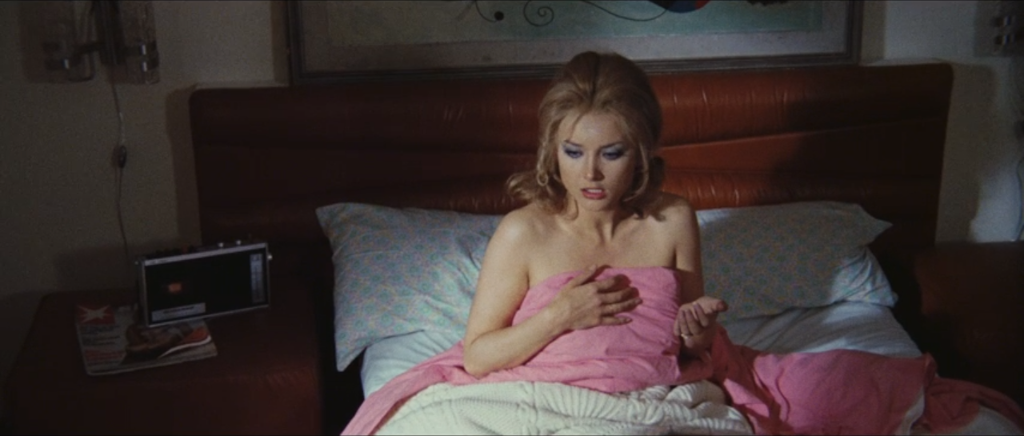
Flash forward, after a title sequence with the sisters playing and fighting, Franziska and Herbert are staying with grandfather and sees red queen running away after she (apparently) scares the patriarch to death. Kitty is unseen and supposedly out of town, evelyn/eveline (dark hair) accidentally killed by kitty years ago
With the title, the movie becomes a game of counting murders. Grandfather starts off the count as #1.
There are: a greasy thug (Peter) extorting Eveline, a woman in a mental institution (Martin’s wife), corporate shenanigans (after Hans Meyer is killed, his suspicious 2nd-in-command Martin takes over), sexcapades (I’m not sure who Martin didn’t sleep with), a stylish clothing company (Springe, German but I can’t help but think of it as Italian), and mysterious/threatening phone calls.
Note: The drowning in water that occurs at the beginning is revisited on a different character at the climax. Wildenbruch = “wild break”.
The Strange Vice of Mrs. Wardh (1971)
[ IMDB | Rotten Tomatoes | Wikipedia ]

Your Vice Is a Locked Room and Only I Have the Key (1972)
[ IMDB | Rotten Tomatoes | Wikipedia ]

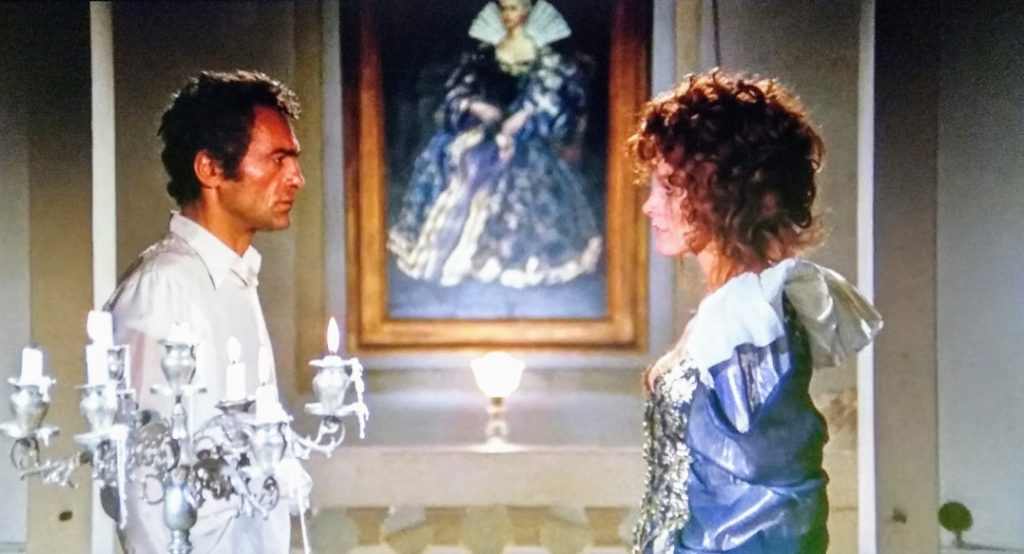
Moody. More Gothic than other giallo films I’m familiar with. Watched this on Amazon Prime and even with my basic Italian there were some oddly wrong translations. Good image but a little dark at times. You never know when that’s the director’s choice.
The scene is a decaying mansion populated by a decaying middle-aged writer, long out of inspiration. He, and his suffering wife, are constantly being contrasted by young vibrancy. The young hippies he hosts for a debauched party in the opening scene. The young maid he “imposes” himself on. The young grocery delivery boy. Fenech, the youthful niece who, with either libertine or menacing intentions, seduces both aunt and uncle.
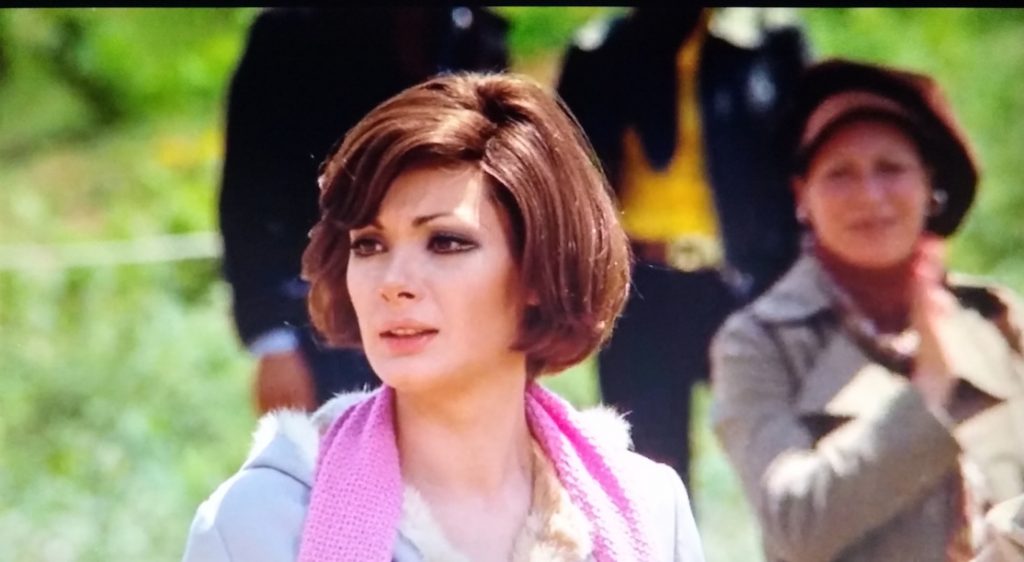
Compared to Fenech’s other roles, her role as the Floriana has her as the strong one here with Anita Stringdberg the character on the edge of sanity. She is psychologically tortured and physically abused, sometimes brutally, by her husband. His deceased mother still controls Oliviero and whose absent presence taunts Irina, along with the ever present cat she left behind, Satan.
The murders, required by any giallo, are in a way resolved halfway through the film and play a role as almost simply decoration to the destructive relationship of Oliviero and Irina. But for the remaining half, they echo in the trio’s maliced schemes towards each other.
And the end, much like that of The Strange Vice of Mrs. Wardh where this film got its title, has So. Many. Twists.